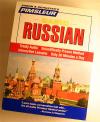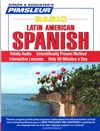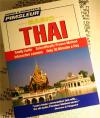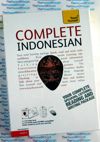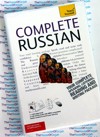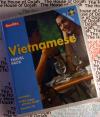Teach Yourself Instant Portuguese - 2 Audio CDs and Book - Learn to speak Portuguese
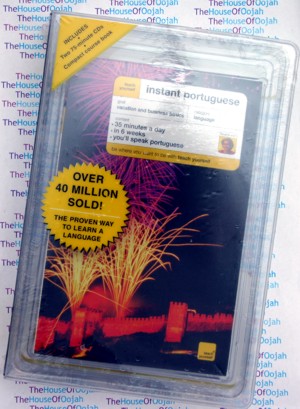
Teach Yourself Instant Portuguese2 CDs and Book Audio CDGet Other Teach Yourself Language Learning Audio click here |
 |
Teach Yourself Instant Portuguese - 2 Audio CDs and BookBrand New (still shrink wrapped): 2 CDs and Book The 35-minutes-a-day, six-week course is highly structured and has a fresh approach to language learning which appeals both to readers who have not learnt the language before and to those with some basic knowledge of Portuguese. The author has used her wide teaching experience to refine the course so that it covers only the grammar (explained in no-nonsense English in the book and on the CDs) and vocabulary which are really necessary. Her day-by-day, no-nonsense programme is easy to follow and fun to do. At the end of six weeks, readers have the confidence and knowledge to tackle all the situations they'll need to know about, such as shopping, eating out and getting around. With fewer than 400 words to learn, and flashcards at the back of the book to help learn them, progress is fast and enjoyable. Programmed learning – easy to follow and keep to Table of Contents: About the Author:Elisabeth has combined teaching languages all over the world for more than thirty years with her career as a very successful businesswoman. She wrote the first Instant title to teach her daughter to speak German and since then she has written a steady stream of best-sellers while keeping up her teaching to ensure that her books are based on first-hand experience and reflect the needs of her students. About the Portuguese LanguagePortuguese is a Romance language that was originated in what is now Galicia and northern Portugal. It is derived from the Latin spoken by the romanized Pre-Roman peoples of the Iberian Peninsula (namely the Gallaeci, the Lusitanians, the Celtici and the Conii) around 2000 years ago. It spread worldwide in the 15th and 16th centuries as Portugal established a colonial and commercial empire (1415–1999) which spanned from Brazil in the Americas to Goa and other parts of India, Macau in China and Timor (north of Australia). It was used as the exclusive lingua franca on the island of Sri Lanka for almost 350 years. During that time, many creole languages based on Portuguese also appeared around the world, especially in Africa, Asia, and the Caribbean. Today it is one of the world's major languages, ranked 6th according to number of native speakers (between 191 and 230 million). It is the language of about half of South America, even though Brazil is the only Portuguese-speaking nation in the Americas. It is also a major lingua franca in Portugal's former colonial possessions in Africa. It is an official language in nine countries (see the table on the right), also being co-official with Cantonese Chinese in the Chinese special administrative region of Macau, Tetum in East Timor and Spanish and French in Equatorial Guinea. There are sizeable communities of Portuguese speakers in various regions of North America, notably in the United States (New Jersey, New England, California and south Florida) and in Ontario, Canada. Spanish author Miguel de Cervantes once called Portuguese "the sweet language", while Brazilian writer Olavo Bilac poetically described it as a última flor do Lácio, inculta e bela: "the last flower of Latium, wild and beautiful". Portuguese is also termed "the language of Camões," after one of Portugal's best known literary figures, Luís Vaz de Camões. Today, Portuguese is the official language of Angola, Brazil (190.6 million), Cape Verde, Guinea-Bissau, Portugal (10.6 million) [9], São Tomé and Príncipe and Mozambique. It is also one of the official languages of the special administrative region of Macau (with Chinese) and East Timor, (with Tetum). It is the language of most of the population in Portugal (100%), Brazil (100%), São Tomé and Príncipe (95%) and Angola (80%), and is the most widely spoken language in Mozambique (40%), though only 6.5% are native speakers. No data are available for Cape Verde, but almost all the population is bilingual, and the monolingual population speaks Cape Verdean Creole. Portuguese is an official language of several international organizations. The Community of Portuguese Language Countries(with the Portuguese acronym CPLP) consists of the eight independent countries that have Portuguese as an official language. It is also an official language of the European Union, accounting for 3% of its population, Mercosul, the Organization of American States, the Organization of Ibero-American States, the Union of South American Nations, and the African Union (one of the working languages) and one of the official languages of other organizations. The Portuguese language is gaining popularity in Africa, Asia, and South America as a second language for study. Small Portuguese-speaking communities subsist in former overseas colonies of Portugal such as Macau, where it is spoken by 7% of the population, and East Timor (~20%). Uruguay gave Portuguese an equal status to Spanish in its educational system at the north border with Brazil. In the rest of the country, it is taught as an obligatory subject beginning by the 6th grade. Portuguese and Spanish are the fastest-growing European languages (with the exception of English, being the world lingua franca)[citation needed], and, according to estimates by UNESCO, the Portuguese language has the highest potential for growth as an international language in southern Africa and South America. The Portuguese-speaking African countries are expected to have a combined population of 83 million by 2050. In total, the Portuguese-speaking countries will have 335 million people by the same year. Since 1991, when Brazil signed into the economic market of Mercosul with other South American nations, such as Argentina, Uruguay, and Paraguay, there has been an increase in interest in the study of Portuguese in those South American countries. The demographic weight of Brazil in the continent will continue to strengthen the presence of the language in the region. Although in the early 21st century, after Macau was ceded to China in 1999, the use of Portuguese was in decline in Asia, it is becoming a language of opportunity there; mostly because of East Timor's boost in the number of speakers in the last five years but also because of increased Chinese diplomatic and financial ties with Portuguese-speaking countries. In July 2007, President Teodoro Obiang Nguema announced his government's decision to make Portuguese Equatorial Guinea's third official language, in order to meet the requirements to apply for full membership of the Community of Portuguese Language Countries. This upgrading from its current Associate Observer condition would result in Equatorial Guinea being able to access several professional and academic exchange programs and the facilitation of cross-border circulation of citizens. Its application is currently being assessed by other CPLP members. In March 1994 the Bosque de Portugal (Portugal's Woods) was founded in the Brazilian city of Curitiba. The park houses the Portuguese Language Memorial, which honors the Portuguese immigrants and the countries that adopted the Portuguese language. Originally there were seven nations represented with pillars, but the independence of East Timor brought yet another pillar for that nation in 2007.
|
Teach Yourself Instant Portuguese - 2 Audio CDs and Book |

 0 Items (Empty)
0 Items (Empty)
